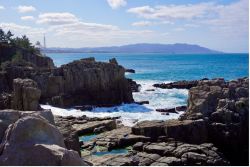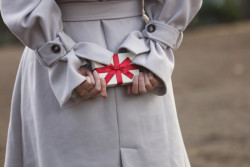
Originally published on metropolis.co.jp on October 2011

THE BIG FREEZE
- The first snowfall of the season was recorded on October 3 in Asahikawa, Hokkaido. It had been 113 years since snow fell so early in the year in Japan.
- The Chinese government denied a request by Fuji Heavy Industries to enter into a joint venture with a midsize domestic automaker in Dalian.
- Owners of Korean restaurants are up in arms over new safety guidelines that require them to cook meat “at more than 60 degrees Celsius for at least two minutes.” The regulations are in response to an E. Coli outbreak from a raw-beef dish that killed four people and sickened dozens this spring.
- Headline of the Week: “Problematic Wild Goats on Kyushu Islands Put to Good Use Through Eco-weeding Project” (via The Mainichi Daily News)
FAMOUS FIRSTS
- A research team led by a professor at Utsunomiya University has found that crows can “recognize symbols representing different quantities.”
- Scientists from the National Institute for Materials Science and Tohoku University have discovered how strings of amino acid are formed. The finding could prompt “a revised look at the view that life on earth began in the sea.”
- Researchers at The National Institute of Advanced Industrial Science and Technology in Ibaraki have developed a material that can be printed like ink and that “uses temperature differences to generate power.”
- The Japanese Coast Guard has appointed two women to serve as investigators of accidents and crimes occurring at sea. It’s the first time that women have held such a post.
FOREIGN INTRIGUE
- Police in Myanmar suspect a motorcycle-taxi driver attacked and killed a 32-year-old Japanese tourist who had hired him for a ride in the ancient city of Bagan.
- Japan’s Self-Defense Forces and the US military have agreed to allow “SDF tanker aircraft to refuel US military airplanes midair” during joint exercises.
- Meanwhile, the SDF is said to be considering an extension of its peacekeeping mission in Haiti by another year, to January 2013.
- Sentence of the Week: “Part of a media installation created by a Swiss visual artist has been stolen from the men’s room of the 21st Century Museum of Contemporary Art in Kanazawa, Ishikawa Prefecture, museum officials said Saturday.” (via Kyodo)
YOU CAN’T MAKE THIS STUFF UP
- The co-pilot of an ANA jet flying from Okinawa to Tokyo caused the plane to roll 131 degrees—in other words, nearly upside down—after he “mistook the rudder trim knob for the cockpit door lock switch.” Two flight attendants were injured.
- Someone left a bag containing ¥10 million in a bathroom in the city hall of Sakado, Saitama Prefecture, along with a note saying that the money was for “the people of Tohoku.” That’s $130,000, folks.
- The Metropolitan Police Department says that the number of citations it has issued to people riding “fixies”—fixed-wheel racing bicycles with no brakes—has increased from 2 in 2009 to 661 in 2010.
- It was reported that former PM Naoto Kan has visited 55 of the 88 temples that make up the traditional Shikoku Pilgrimage route.
GULP!
- TEPCO says that if its water-injection efforts at the Fukushima Daiichi nuclear plant were to be halted for some reason—say, something crazy like an earthquake and tsunami—it would take only 38 hours for the fuel rods to start melting down.
- The Meteorological Agency revealed that, out of the 170-plus tsunami observatories around the country, it has no earthquake resistance data for 102 of them.
- A Board of Audit survey revealed that Tokyo University owns some ¥15 billion worth of “unutilized and unnecessary facilities,” including a 60km2 plot in Chiba that’s been vacant for several years.
- Investigators believe a visually impaired woman accidentally fell onto the tracks at Hajima station in Akashima, West Tokyo, before being hit by a train and killed.
POLICE BLOTTER
- Tokyo police busted a Turkish man for smuggling about 2kg of speed into the country “by hiding [the drugs] in a wooden box sent from Turkey to his motorcycle shop” in Itabashi-ku.
- Meanwhile, officials at Narita Airport say they confiscated 119kg of methamphetamines in the first half of 2011. That’s almost double the amount nabbed in the first six months of 2010.
- Authorities are concerned about dozens of Japanese-language websites from China that sell unlicensed medicines, including “pills to treat erectile dysfunction that contain doses exceeding the legal amount approved by the Japanese government.”
- Meanwhile, cops around the country busted 14 people for operating websites that offer illicit or unapproved drugs.
ELECTRIC AVENUE
- A taxi stand for electric and hybrid vehicles made its debut in front of the Shin-Marunouchi Building near Tokyo station.
- The Bank of Tokyo-Mitsubishi UFJ is getting together with a group of overseas banks to finance a “mega solar power plant construction project” in Canada, to the tune of ¥8.5 billion.
- Former Japanese ambassador to the US Shunji Yanai was elected to a three-year term as president of the International Tribunal for the Law of the Sea. The job involves “dispute resolution over maritime borders” and, less dramatically, “resource development.”
- The health ministry says that average annual medical expenses for Japanese people aged 65 or older are ¥687,700, but for those aged 64 or younger it’s just ¥163,000.
HERE AND THERE
- A Tokyo-based “marital information provider” says that business has been booming since the March 11 earthquake because unmarried people are fearing an “uncertain future following the life-altering disaster.”
- On the other hand, it was reported that the number of divorce applications in Sendai has increased 40 percent in the six months since the quake, compared to a year earlier.
- Officials in Taito-ku have begun a telephone-based interpreting service to help staff at souvenir shops communicate with foreign tourists.
- Among the cultural assets for which Japan is seeking UNESCO World Heritage status are Mt Fuji, the city of Kamakura and “the country’s oldest government-run silk mill.”
- UNESCO is also being asked to designate a 14,580-hectare evergreen broadleaf forest in Miyazaki as an eco park.
Compiled from reports by AP, Japan Today, Bloomberg, The Japan Times, The International Herald Tribune, The Asahi Shimbun, The Mainichi Daily News, Daily Yomiuri, AFP, Reuters and Kyodo







